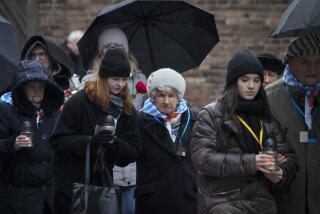April 24 Holiday Declared in Republic for First Time : Soviet Armenia to Mark Massacre Anniversary
- Share via
MOSCOW — For the first time, the government in Soviet Armenia has declared a holiday to commemorate the 1915 massacre of an estimated 1.5 million Armenians in Turkey.
Much criticized for its past refusal to mark the anniversary formally, the Armenian republic’s Council of Ministers announced this week that Monday, April 24, will be a “day of remembrance of the victims of Armenian genocide” and an official holiday in Armenia.
The observance is certain to be particularly poignant after the deaths of more than 25,000 people in the Armenian earthquake in December and the deaths of more than 90 others, two-thirds of them Armenian, in the civil unrest last year in Armenia and neighboring Azerbaijan.
Two-Year Campaign
In the past, government officials participated in low-key ceremonies in Yerevan, the Armenian capital, and at a monument outside the city on April 24, the anniversary of the first arrests in what became a two-year campaign to drive the Armenians from Turkey.
But Soviet officials had steadfastly refused to declare a holiday out of fear that this would contribute to an upsurge of Armenian nationalism by encouraging people to think of themselves first as Armenians rather than citizens of the Soviet Union.
The decision meets a key demand of the Karabakh Committee, an Armenian nationalist group that succeeded in mobilizing virtually the entire population of the republic over the past year. While the committee’s principal focus was the future of Nagorno-Karabakh, an Armenian enclave in Azerbaijan, it also sought action on a range of other issues, including commemoration of the genocide.
All the leaders of the Karabakh Committee have been detained by Soviet authorities, and most are expected to stand trial later this year on charges stemming from the months of protests in Armenia and in Nagorno-Karabakh.
Several other Soviet republics have begun observing their own national holidays in the last year. Estonia, Latvia and Lithuania have each observed the date of their independence from Czarist Russia in 1918.
Making Up Lost Time
Moscow’s only requirement, so far, has been that workers make up lost production time.
Soviet historians, particularly Armenians, have written frequently about the pogrom against the Armenians in Turkey, focusing on both the human and the political consequences but using it as well to argue the case of Soviet Armenia as the national homeland and haven for Armenians.
“Thanks to the Great October Socialist Revolution and the Soviet Communist Party’s wise Leninist nationality policy, the people of Armenia did not perish, did not disappear,” a prominent Armenian historian wrote in the Communist Party newspaper Pravda on the 60th anniversary of the first massacres. “They have now occupied a worthy place in the fraternal family of Soviet peoples and together with them are working confidently toward the realization of the cherished ideals of communism.”
More to Read
Sign up for Essential California
The most important California stories and recommendations in your inbox every morning.
You may occasionally receive promotional content from the Los Angeles Times.













